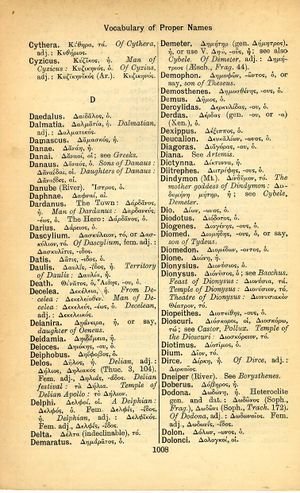Damascus
χρώμεθα γὰρ πολιτείᾳ οὐ ζηλούσῃ τοὺς τῶν πέλας νόμους → we live under a form of government which does not emulate the institutions of our neighbours
English > Greek (Woodhouse)
Δαμασκός, ἡ.
Latin > English (Lewis & Short)
Dămascus: (-os, Luc 3, 215; cf. Prob. II. p. 1462
I fin. P., p. 121 Lindem.), i, f., Δαμασκός, Heb. Dammesek or Darmesek, the very ancient capital of Coelesyria, on the Chrysorrhoas, celebrated for its terebinths, and, since the time of the Emperor Diocletian, for its fabrics in steel, now Dameshk, Curt. 3, 12 sq.; Plin. 5, 18, 16, § 74; 13, 6, 12, § 54; Flor. 3, 5, 29; Stat. S. 1, 6, 14; Vulg. Gen. 14, 12.—Hence,
I Damascus, a, um, adj., of Damascus (eccl. Lat.), Vulg. Gen. 15, 2.—
II Dăma-scēnus, a, um, adj., of Damascus, Damascene: pruna, Plin. 15, 13, 12, § 43; Pall. Nov. 7, 16; Mart. 13, 29; cf. absol., id. 5, 18, 3 (Eng. damson); and pruna Damasci, Col. 10, 404.—
B Subst.:
1 DAMASCENVS, i, m.,
(a) a surname of Juppiter, Inscr. Grut. 20, 2.—
(b) Plur.: the people of Damascus, Vulg. 2 Cor. 11, 32.—
2 Dămascēna, ae, f. (sc. regio), the region about Damascus, Plin. 5, 12, 13, § 66; in the Greek form Damascene, Mel. 1, 11, 1.

